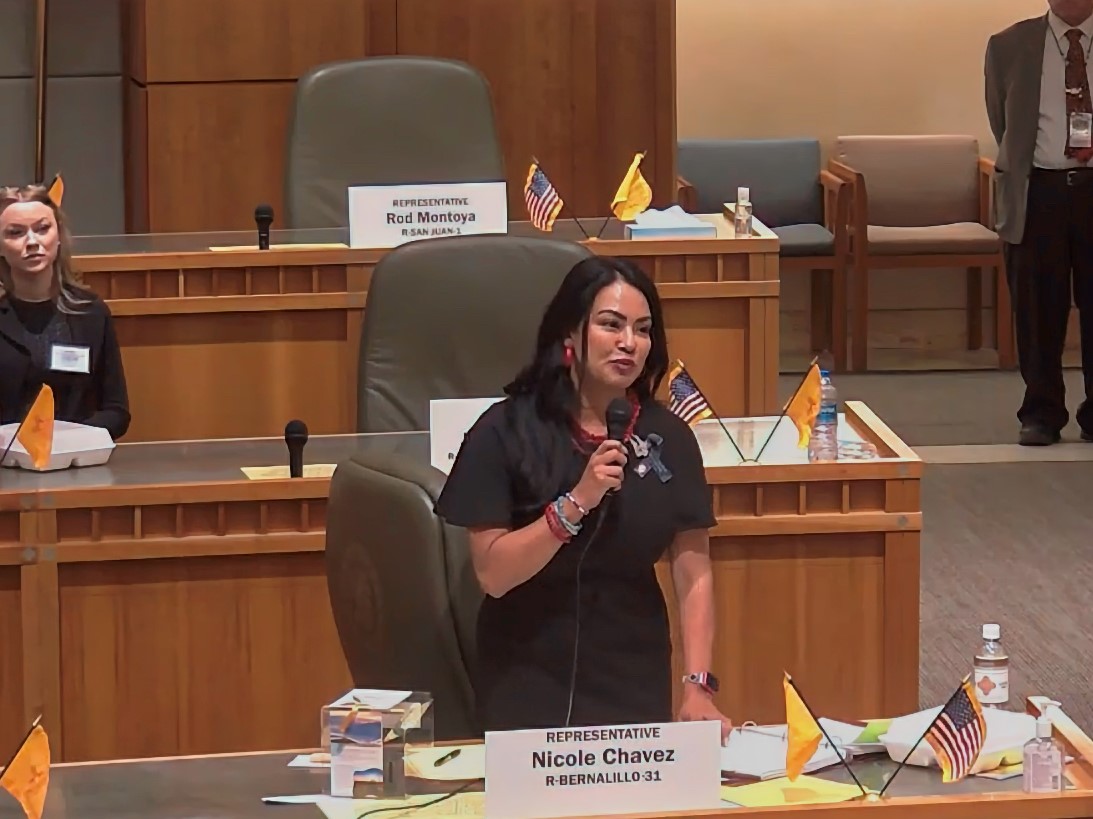A GOOD DAY FOR OIL AND GAS

HOUSE ENERGY TABLES VAGUE PROTECTION OF
‘PUBLIC HEALTH’ AND ‘ENVIRONMENT’

This morning the House Energy and Natural Resources Committee voted 6-5 to table the committee substitute for House Bill 34, Oil & Gas: EMNRD Mandate to Protect Public Health & Environment, sponsored by Reps. Debra Sariñana (D-Bernalillo) and Tara Lujan (D-Santa Fe). The Chamber again testified in strong opposition to this vague, overbroad, duplicative unfunded mandate that targets responsible oil and gas producers.
D’Val Westphal, executive vice president for policy and programs at the Greater Albuquerque Chamber of Commerce, told the committee:
“While well-intentioned, this bill expands the responsibilities of the Oil Conservation Division broadly, vaguely, and exponentially, with no definition of what, exactly, OCD will be charged with protecting regarding ‘public health’ or ‘environment.’ Thus, it opens up the department to unrealistic demands, unfunded mandates and potential litigation when it does not deliver on that which is not spelled out. It also promises to unnecessarily duplicate work already being done by the Air Quality Bureau and the New Mexico Department of Environment.
“We at the Chamber, like all New Mexicans, want clean air and water and to protect our environment for the generations to come. This requires good regulations that are clearly defined, providing specific guidance so it can be determined if they are followed or broken. Unfortunately, the only clarity HB 34 promises is massive litigation filed against OCD.
“We respectfully ask that you vote against HB 34. Thank you.”
Joining the Chamber in opposition:
- NMOGA, which criticized the duplication of responsibilities and the unfunded mandate, and cited a similar 2019 Colorado law that has seen the orphan well count go up four-fold and rig count drop, causing a huge economic toll on taxpayers.
- The Permian Basin Petroleum Association, which criticized the vague and ambiguous language in the bill, its lack of guidelines and clear definitions, the potential for unintended consequences and pointed out existing law addresses preventing waste and protecting rights.
- The Independent Petroleum Association of New Mexico, which said the bill appears to be a rule-making runaround of the Legislature to get setbacks and that 74-1-2, the Environmental Improvement Act, specifically puts the Environment Department in charge of protecting health, safety and comfort – not OCD.
Supporters testified about the effects pollution has on communities – a serious concern that the vague language of HB 34 does not address.
Committee member Rep. Meredith Dixon (D-Bernalillo) asked if the bill defines “public health,” and when the bill sponsor’s expert witness, Gail Evans, senior attorney for the Center for Biological Diversity, responded it does not, but that the term appears throughout statute, Dixon asked how the Legislature was supposed to ensure uniformity and enforcement. She said she has a fundamental concern that the bill delegates the Legislature’s authority to an unelected board, and she said the fact the Environment Department did not submit analysis of the bill also was concerning.
Rep. Nathan Small (D- Doña Ana) said he could not support the bill because a future administration and its appointees could decide unilaterally to stop oil and gas production in New Mexico, severely affecting all facets of life here while the industry continues unfettered in Texas.
Rep. Mark Murphy (R-Chaves), an oil producer, went over the procedures in place to avoid and address waste and spills and safeguard environmental safety on oil and gas production sites, from cement casings to air monitors, trash trucks to portable toilets.
Dixon and Small joined the Republicans on the committee to first vote against a do pass, and then in favor of tabling.
STRANGE POLITICAL BEDFELLOWS
– GOV’S STRATEGIC WATER PLAN STALLS

It’s not every day that you see environmental advocates and businesses stand in opposition to the same bill. Today, that combination stalled passage of House Bill 137, sponsored by Rep. Susan Hererra (D-Rio Arriba, Sandoval, Santa Fe & Taos) on behalf of the governor seeking to establish the strategic water plan and fund.
Terri Cole, President and CEO of the Greater Albuquerque Chamber of Commerce, testified in opposition, stating:
“The Chamber generally supports the goal of creating a strategic water supply in order to improve the state’s drought resilience and for use in developing green energy. However, we’re concerned about what the funding mechanism will be and that it will place a tax on our oil and gas production. Therefore, we reluctantly must oppose HB 37 at this time.”
Indeed, the funding would be provided by a new tax of 5 cents on every barrel of produced water. The goal of figuring out how to use produced and brackish water for industrial purposes, thereby saving fresh water, is laudable, especially in a state like ours that needs every drop of water. However, there’s no equity in placing the financial burden solely on the backs of our oil and gas industry.
Environmental interests are concerned about the release of toxic materials from produced water and the lack of scientific evidence that there is a feasible way to treat the water while still protecting groundwater and, more generally, the environment. It seems that all sides support provisions of the bill that call for more research by both New Mexico Tech and New Mexico State universities. Also, there seemed not to be much opposition to the use of brackish water. Produced water, which rises to the surface as a result of drilling oil wells, appears to be the lightning-rod issue. About 60% of produced water is used for fracking wells, often with chemicals added.
Rep. Micaela Cadena (D-Doña Ana) zeroed in on the need for complete regulations to be developed before proceeding with construction of projects. And, she emphasized that development of regulations must proceed “at the pace of science.” She does not believe the Legislature should move forward until the regulations are in place and the Legislature can see exactly how all this will work. Rep. Angelica Rubio (D-Doña Ana) echoed the concerns of many environmental opponents about what they perceive to be taxpayer money being used to solve an oil industry issue. In fairness, if the oil industry is paying a new tax, then taxpayers in general won’t be burdened except for the initial appropriation to jump-start the process.
As members of the committee one after another raised concerns about the bill, it became obvious it would not pass today. Consequently, Hererra asked for the bill to be rolled over in order to see if amendments could be developed to overcome opposition. We do not know when the bill may be back for further consideration. Moreover, this bill has three committee referrals (most bills only get two), which means it has a long way to go and a short time to get there. We’ll keep you posted.
HOUSE COMMITTEE RIGHTS SENTENCING
FOR DWI VEHICULAR HOMICIDE
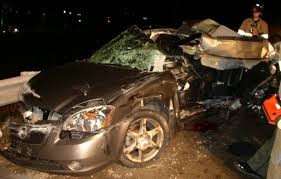
Rep. Andrea Reeb (R-Chaves, Curry & Roosevelt) is seeking to remedy a loophole which allows murder by vehicle to receive a sentence less than intended by the Legislature. The measure, House Bill 102, passed the House Consumer and Public Affairs Committee on a bipartisan vote of 6-0. This is one of those funny things that happened to me on the way to the laundromat stories. Stick with us.
J.D. Bullington registered the Chamber’s support for the measure:
“Madam Chair and members of the committee. I’m J.D. Bullington, appearing on behalf of the Greater Albuquerque Chamber of Commerce. I appear before you today in support of HB 102, which seeks to repair what many believe to be a legislative oversight. As you know, last year the Supreme Court ruled that current law can allow those convicted of murder by vehicle to earn good time credits that can result in cutting their sentences in half. This just isn’t right.
“In 2016, the Legislature changed vehicular homicide by DWI or reckless driving from a third-degree felony to a second-degree felony and, therefore, the criminal is no longer treated as a serious violent offender, which requires that a minimum of 85% of the sentence be served before they can be paroled. This oversight needs to be remedied. Murder is murder, and the punishment must fit the crime. We urge you to vote yes on HB 102.”
Back in 2016, the Legislature did a good thing. They increased the penalty for vehicular manslaughter from a third-degree felony to a second-degree felony. Before this law passed, the third-degree felony was considered a serious violent crime, allowing judges to weigh all the factors and, when justified, to require the serious violent offender to serve 85% of their sentence before meritorious conduct deductions could be applied to reduce their sentence. A serious violent crime has to be enumerated in statute, and the third-degree vehicular homicide was on that list.
However, when the new law was passed in 2016, the second-degree crime was not placed on the list. A Supreme Court decision last year released a convicted criminal sentenced by a judge as a serious violent offender because the crime wasn’t on the list and the judge was not allowed to interpret what the Legislature intended. As mentioned in our testimony, meritorious behavior can reduce a sentence by one day for every day served. Suddenly a two-year sentence turns into one year. This is the loophole that needs to be fixed, and HB 102 does just that. It puts the crime back on the naughty list where it belongs.
HB 103 PROTECTS THOSE WHO PROTECT US

What we don’t want to see are any more names added to the memorial honoring law enforcement officers killed in the line of duty. HB 103, sponsored by Rep. Andrea Reeb, a former prosecutor, received a 6-0 do-pass recommendation from the House Consumer and Public Affairs Committee this afternoon. Her bill would increase the penalty for assaulting a police officer.
J.D Bullington offer the Chamber’s support:
“I’m here today to strongly support HB 103. A common slogan of a police department is to ‘protect and serve.’ Indeed, this is exactly what our law enforcement officers do day-in and day-out. They often have to face violence in the course of their daily duties. It’s a tough job – they run toward danger in order to protect us. The least we can do is provide them the maximum support and protection under the law.
“That’s why this bill is so important. As we know, the bill would move the penalty for assaulting a police officer from a third-degree to a second-degree felony. What this means in practical terms is that the statute of limitations for prosecution is increased from five to six years, the basic sentence is increased from three to nine years, and the potential fine is raised from $5,000 to $10,000. We need to signal that assaulting a police officer is a serious offense and offenders will be punished accordingly. Let’s support our officers by passing HB 103.”
Speaking on a personal note, J.D. reminded the committee of all the horrendous videos on social media that show what law enforcement officers have to endure. This lines up with very emotional and often tearful testimony provided by three officers that had been shot in the line of duty. All recounted the horror of facing death, the lasting physical and mental damage and the toll on their families wondering whether mommy or daddy would make it home at night.
Many stood in support: police officers, firefighters, the AFL-CIO, the New Mexico Business Coalition and the Governor’s Office. The only opposition came from the Law Offices of the Public Defender, which continues to argue that stiffer penalties aren’t a deterrent. Well, that’s debatable, but for sure it deters that one criminal from committing any more crimes while in the house of many doors.
Not only are there consequences to the officers that were assaulted, but there are broader community impacts, including increased difficulty in recruiting and retaining people to the profession. One officer candidly admitted that if she had to do it all over again, she’s not sure she would have joined the police. While quite understandable given her terrible experiences, it is also not the kind of testimony that attracts others. Indeed, we need to stand up for those that protect us.
INVESTING IN OUR MILITARY BASES ADVANCES
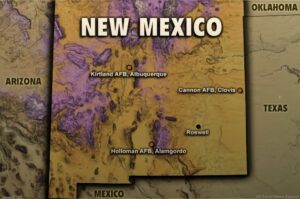
The Chamber understands that our military bases’ strategic importance to our national defense and local economy cannot be overstated. Every single base throughout the state is a critical component of our local and state economies.
Rep. Debra Sariñana (D-Bernalillo) today presented HB 158, the Military Base Planning and Impact Act in the House Labor, Veterans’ and Military Affairs Committee. The bill allocates $12 million that can be used by local governments for infrastructure projects aimed at keeping our bases operational and efficient. We’re talking infrastructure improvements outside of these installations, like roads, water sources, schools and health care facilities.
Chamber Legislative Session and Local Government Committee Chairman Sherman McCorkle was on hand to lend the GACC’s support. He explained that 30 years ago, military bases were completely self-sustained, with schools, child care and other necessities all within the fence of each installation. McCorkle says that has all changed, and it’s critical that local communities step up to support their military installations.
“The Department of Defense now looks at states and asks them, what can you do to help us with health care? What can you do to help us with child care?” McCorkle told the committee. “This particular fund is very important because it will address infrastructure immediately exterior to the military installation. It would address things such as roadways, asphalt, intersection crossings, traffic lights, railroad crossings, various kinds of fencing, all the things that are outside of the fence but are critically necessary to a base’s success.”
Many of us remember in 1995 Kirtland Air Force Base was put on the BRAC closure list. McCorkle was one of the co-founders of the Kirtland Partnership Committee and led the valiant efforts to keep KAFB open. In 2005 he also worked with other stakeholders to keep Cannon Air Fore Base and the White Sands Missile Range off of the closure list.
Sariñana’s bill passed unanimously and drew several positive comments. Nobody spoke against this effort. We’ll continue to track this legislation because this is a critical effort for our state’s economy. Next, the bill moves to the House Appropriations and Finance Committee.
IN THE HOUSE
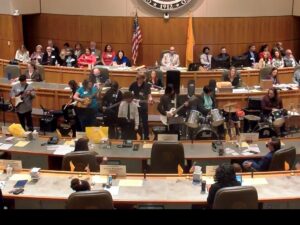
They Rocked the House!
The Harrison Middle School rock band had the feet tapping and the heads bobbing as the performed for the House today. The school is located in Bernalillo County’s South Valley. Rep. Pamelya Herndon (D-Bernalillo) introduced the group. As the Speaker said, they young folks have a very bright future – they’re good students and good musicians!
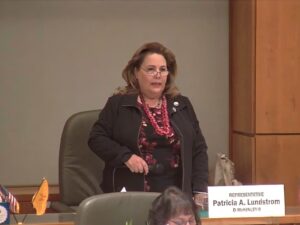
Most Patriotic City in New Mexico
Rep. Patty Lundstrom (D-McKinley) kicked off Gallup/McKinley County day with a memorial in the communities’ honor. As the home of a national cemetery, Gallup honors veterans in many ways. Gallup is also named the Adventure Capital of New Mexico as it is the gateway to many beautiful recreational opportunities along with wonderful art and cultural resources.
Valencia County was also honored today and threw a matanza complete with chicharones for members of the Legislature. The county is the second-fastest growing in the state and hosts the world’s largest matanza.
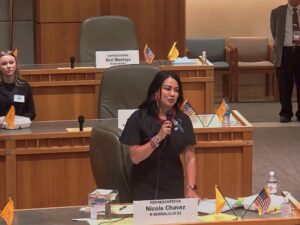
Victims of Violent Crime Honored
Rep. Nicole Chavez (R-Bernalillo), who lost her son to murder, sponsored a memorial honoring victims of violent crime and their families, many of whom were in attendance in the House today. There were many tears. As Rep. Cathryn Brown (R-Eddy & Lea) observed, “Grief is love without a place to go,” recognizing the deep pain experienced by losing a family member.
Rep. Rebecca Dow (R-Doña Ana, Sierra & Socorro) said that which is “predictable is preventable,” vowing to fight for legislation that will help prevent these kinds of tragic crimes in the future.
SIGNING OFF FROM SANTA FE
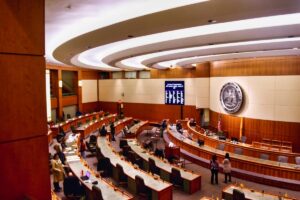
It was a banner day for common sense. Let’s hope it’s catching – about every other virus known to mankind surfaces as the Capitol Crud every session. Anti-oil-and-gas industry legislation was defeated, while strong anti-crime measures got some traction. It’s a good trend, let’s hope it keeps up, but we have yet to face the two Judiciary Committees, and that’s a challenge, especially in the Senate. Tomorrow is American Indian Day, which will be celebrated in a joint session at noon. The House revs up at 10:30 and the Senate at 11:00. The Speaker announced today that likely starting next week we can expect to have both morning and afternoon/evening House sessions. As always, we’ll be there to bring you all the news and views. Have a super evening.



